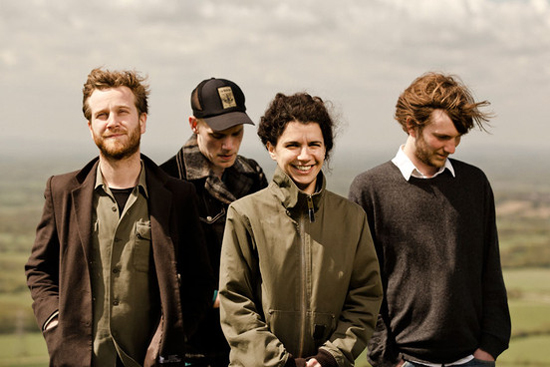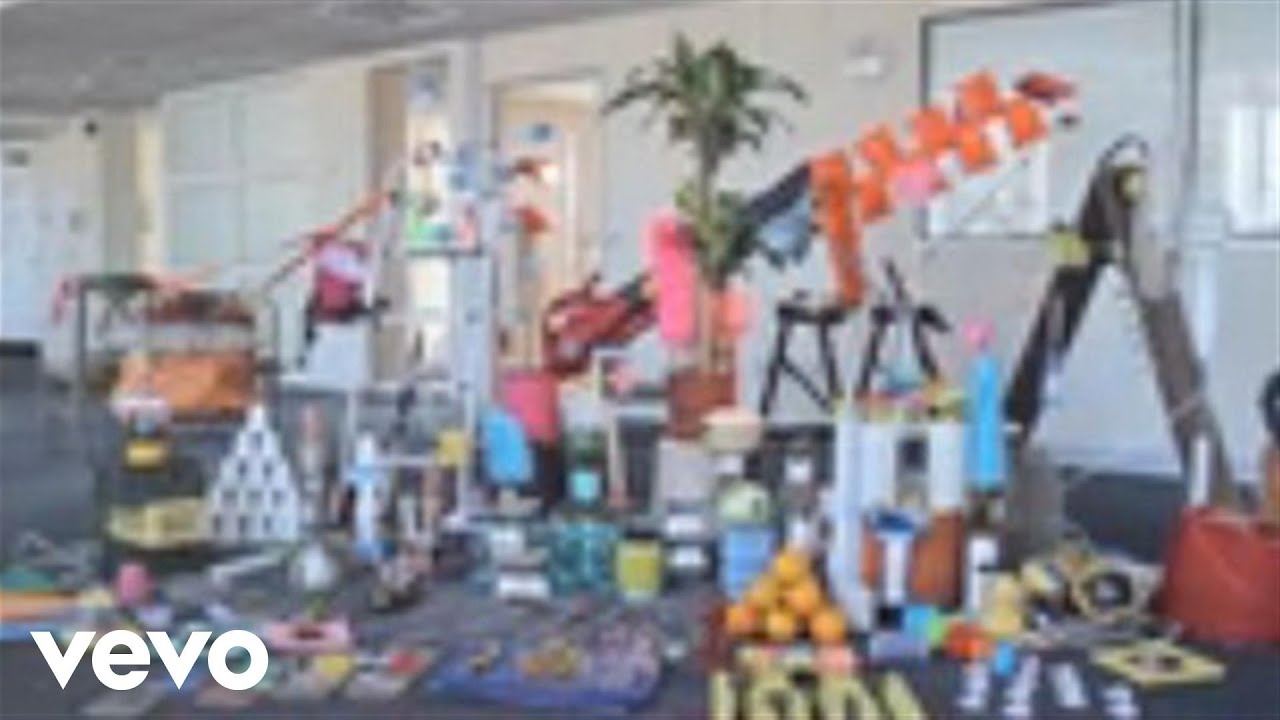Last year, Denmark’s Pinkunoizu released a debut album, Free Time!, that resolutely refused lazy genre-fication; its playful myriad of ideas showed off a band intent on space-pop exploration. Their live shows at the time added to the excitement, with the group – made up of Andreas Pallisgaard, Jaleh Negari, Jeppe Brix and Jakob Falgren – mixing moments of faithful representation with thrilling passages of snaking improvisation.
Fast-forward twelve months, and new album The Drop builds on the expansive experimental essence of Free Time! and recent EP Second Amendment, while also presenting darker tones and a bleaker world outlook. Recorded on the fly during a one-week period at Sauna Studios in Copenhagen, The Drop achieves the notable trick of wrapping glorious pop song structures in kaleidoscopic textures of folk, electronica and shifting polyrhythms.
However, amid the wanton eclecticism, the album is bound together by a central theme. Many songs feature what singer and guitarist Pallisgaard calls ‘the drop’, a subtle shift between two tones that creates the sense of "falling, or being submerged." If the concept appears flaky, it works beautifully – from the initial warped sample on the opening ‘The Great Pacific Garbage Patch’ to the persistent hum that frames the gentle folk of the closing ‘Down In The Liverpool Steam’.
When I speak to Pallisgaard, he’s recently returned from the band’s first experience of playing at Glastonbury ("I found it a bit too big for me – by comparison, Roskilde was only 125,000 people"). He is easily impressed by my interview technique ("I’m just happy you didn’t ask the question about our fucking name") even though I spend too much of his time trying to dig for a sense of just how Pinkunoizu use spontaneity and intuition to create their endlessly fascinating sound worlds. I’m over-analysing the situation. Pinkunoizu don’t over think – their music is all about feel.
The entire band now lives in Copenhagen. How did that impact the making of The Drop?
Andreas Pallisgaard: The way we did the first album, two of us lived in Berlin and two of us lived in Copenhagen. We travelled back and forth and when we met up it was really intense. We would have a week and go into it fully focused. This time we were all together in Copenhagen. When you are always together, you can always touch base and exchange ideas, but it can become a bit less focused. But, in many other ways it was a lot easier.
Did you have an initial vision for how you wanted the record to sound?
AP: No – and the process for this album was quite different. Free Time! was perhaps a bit more conceptual. This time around ended up being much more improvised, and we didn’t have an overview to start with. We made everything in a short period. We had a lot of draft ideas lying around – dictaphone recordings and lyrics and stuff – and we went into the studio and listened to what we had. We had perhaps forty ideas for new songs and ended up rating them all. Then we just took those ideas into a studio and spent a week recording.
A week? Wasn’t that a bit stressful? What would have happened if you hadn’t recorded anything of worth in that time? Would you have just gone back and spent more time recording?
AP: We wouldn’t have had the money to do another week. It was exciting. It wasn’t stressful – we have played together since 2009, so we know that we can make things happen. Of course, we had some thoughts of what we might do, but it was very much about getting rough ideas down and making a decision about a song on the fly. This time we wanted to capture a live feel, mixed with collages of sound. We wanted a bit more of the energy of when we play live. We also rely quite a lot on the post-recording process. Some of the songs recorded for The Drop were just skeletons of ideas, captured with good sound. We brought it back home to our apartment, where we have a tiny studio room upstairs. We listened to all the things we had recorded and then could edit and chop and move things back and forth.
So, how does this spontaeous approach eventually coalesce into a coherent album?
AP: We always improvise a lot when we play together in rehearsals. We have the view that if we have a really strict idea up front, it can tend to be a bit too forced to try and realise that vision. Usually, we try and do things subconsciously and then we can step back at a certain point and organise everything. Then we can begin to see the patterns and connections, and then the vision for the record comes at a later point, usually during the mixing process.
I believe the theme – and the title – of the album is centered around the concept of ‘the drop’. Can you explain that for me?
AP: We stepped back and started to intellectualise all of the material. We began to see different themes and once we’d seen them, we could begin to nuture those themes. One of those themes was the idea of a descent into something – the idea of getting immersed in whatever substance, be it a sonic idea or a philosophical or political thought. The ‘drop’ idea came from listening to the sounds and we found that a lot of places had something really repetitive, like a cyclic monotone feeling, and around that continuous flow there was something that was ever-shifting and keeps on falling down in pitch. Musically, we could take a tone and then bend it to another tone. Between those two tones there is a gliding shift of all the frequencies in that minor step. So, sonically, ‘the drop’ idea is to create an album where you feel that you are sort of falling down into something and then at certain points you feel like you are actually lifting or levitating.
The Drop seems a little darker and more intense than your previous work. Do you agree with that?
AP: I think so. Our previous work has been more dominated by a desire to create something that felt uplifting – being more polyrhythmic and including references to African music and other exotic kinds of music. There was an urge to grab something that came from afar and try get a feel for what it would mean from us to work with something that comes from a totally different cultural tradition. This time around the colour of tones we’ve used is darker and the songs are more dystopic.
Why was that, do you think?
AP: I don’t know. We don’t really make many conscious choices. It’s more a natural flow of the energy between the four of us. We will grab an idea and know that’s what we want to do.
What’s fascinating about Pinkunoizu is that even with your desire to experiment, your music still contains a certain structure. You make ‘proper’ songs.
AP: We like having an actual song structure and then placing that song structure in a vast landscape of other sonic experiences. You can be in this catchy song but there is enough time to immerse yourself in a pulsating, rhythmical piece. We like the idea of having actual songs placed inside a whole world of sound. It is important to us to make music that is constantly changing and to be able to navigate across borders, across limitations of genres and all that kind of restrictive genre identity. We don’t want to feel like we have to be a certain type of band, so people know where to put us on their shelf. It’s important to us that we can be all sorts of different things.
I have met a number of bands who have a similar philosophy. Do you think this is to do with the precarious state of the music industry?
AP: Absolutely. That whole idea of being a really easily decipherable band has a lot to do with marketing and the way the economics of the music industry has been working for many years. Everything has to be sellable – so if you want to sell something you need people to know exactly what product they are getting. Now, the industry is changing – because of the internet and globalisation – and a lot of bands are eager to try to express themselves in various ways.
How do you approach your live shows? Is it difficult to balance the fact that some of the audience may love hearing you improvise, but others may want the songs as they sound on the record?
AP: This might sound a bit egotistical, but we really just want to do it for ourselves, and when we do that we hope that the energy will come across as something interesting. We like to present compositional ideas and songs when we play live, but we also like that, when we play, something new can happen on the spot. That dynamic makes the strict musical ideas more interesting and makes the improvised pieces more exciting. We like to have a pendulum going back and forth between those modes.
During those improvisations sections during a show, do you ever play a piece and then want to repeat it in future shows?
AP: Yes, but it can be really difficult to recapture that moment. We would have the feeling of having a really good concert one evening and amazing stuff happened, but it can be really dangerous to try and do the same stuff the next night – it can really flop.
Finally, what might album number three sound like? Do you have any initial ideas?
AP: The whole idea of spontaneity for The Drop was probably a reaction to the first album, which had been lying around for a long period before being released. We were tired of the music, even before it was made into a record. This time we wanted to do it quickly so that when we get the album, the music will still be fresh. So, right now, I was thinking it would actually be quite interesting to do an album where you did a lot of work up front – sitting down and composing – and develop a vision of how you wanted the record to sound exactly. It would be difficult for us, but it would also make us come up with something very different.
Pinkunoizu’s The Drop is out now via Full Time Hobby



